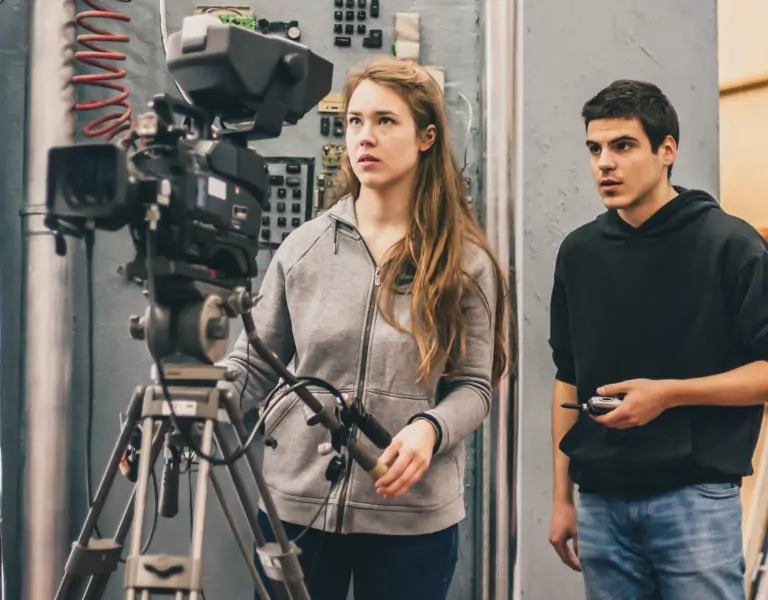TO 2022…AND BEYOND
The immense disruption and turmoil the business has seen over the past two years has created a double-edged sword, with ever larger volumes of work for skilled technicians looking possible, yet the potential for a diluting of the pay and conditions Tim illuminated above is a potentially worrying development. It is certain to be a turbulent time in the business, with some strong contenders to forge ahead, and some wishing they had started earlier to capitalise on the growth in visual entertainment in the form of home streaming of pictures and sales of box sets in other series.
There will be a disparity between the number of talented and experienced individuals able to cherry-pick the very best talent and projects to work on, against those who are further down the skill and experience scale. There will be some who are at the top of the tree, and others who are climbing up with aspirations to be at the top. This happens in any business, incidentally. Remember this when you next go to your dentist or doctor. Were they at the top of the class at university, or did they come midway, or scrape through at the bottom of the class? There will always be one person who comes last. Would you prefer your dentist to be from the top of the class, or one who just scraped through? I know who I would prefer to start to drill a hole in my jaw!
Of course, training and technology in the movie world never really stops, and as we embrace new technology and phase out the previous ways of working there are new areas that develop and become the new normal. In terms of lighting and camera technology, for example, the changes have been immense in the past 15 years, with LED lighting technology now able to accurately generate just about any colour you can imagine in a multitude of different ways. Cameras have developed from the organic and physical 35mm film onto digital sensors with 2K, 4K, 8K resolution and more, all at relatively low prices compared to a few decades ago. Projection and distribution have evolved too, with digital projection now commonplace compared with only a few years ago. Yet the principles of lighting, camera movement, script writing, editing and more are all similar whether a production is on film or digital. The tools are different, and the way light is used can be different, yet ultimately, we are creating images in colour with sound projected in some way to the audience, who then become completely entranced by the story and visual and aural feast they witness before them.
This development all depends on the ability of the movie business to ramp up the training and expertise of a rapidly moving technologically advanced business. The technical ability and experience of the technicians and other key people who make up a functioning and efficient team is the key to the success of any production. Of course, there is always going to be the immense talent at the sharp end from directors, writers, and directors of photography who drive the production and are ultimately in control. Yet the multitude of key skills in set design and building, grip, make up, hair and costume design along with prop making, post-production, sound, and of course lighting, cinematography and many other key skills will be there to support and make the production physically happen. Added to that, there are also trained HGV drivers needed along with catering and a multitude of other skills outside of those we commonly think about.
Going forward, in the next few years there needs to be a concerted effort and investment from the ground up at an early stage of education to nurture and encourage young people to take this route in their chosen careers. The traditional route for most schools is learning a bit of geography, chemistry, history, maths, languages and more, and then specialising in one subject (such as Geography) at university (if the student can afford to attend). There is nothing wrong at all in learning these subjects, they simply make young adults who are good employees, ready to work for an employer and pay taxes. Again, there is nothing wrong with this work plan for the majority. We need employees and employers in all walks of life. Yet for everyone to follow exactly the same route of education will not work for all, as we are all individuals in the way we learn and the aspirations we have for our future work. As an example, a traditional printed book can now be delivered in the form of a sound recording narrated by the author, perhaps a video, a download to be read on a computer device, or in a multitude of other ways. People absorb information in different ways. Some are visual, some prefer sound, and others prefer to learn by reading. There could also be a combination of these different media types, with a set of instructions on a downloaded page, along with a video to show you how to change a fuel pump on a Range Rover, for example.
There are generally no entrepreneurial or business skills taught outside of this narrow collection of traditional subjects, and most likely art or woodwork is the closest many students get to something slightly different and creative. Acting, music, and art are some of many subjects studied in equal proportion. Yet this creativity is where the film industry, entertainment, and art thrive, and many people who eventually become hugely successful, do so despite the formal education, not because of it. We need to nurture this outstanding creativity when it is noticed, and then channel them to different forms of learning outside of the normal curriculum.
This is not for everyone, of course, and many people I went to school with have been happy to have a job in insurance or banking, for example, go for one holiday a year, and then retire after 40 years or so with a house paid for, and a pension. Yet they have not lived the experiences we have in the moving picture business. They have not travelled to strange and wonderous locations and worked with wonderful creative people who want to change the world in some way and make a statement through the magnificent medium of moving images.
Another way to stimulate a different outlook than conventional school is to provide the structure for a diverse area of study in the areas of artistic, creative, and imaginative outlets. One such organisation is based in Elstree, called the Elstree Screen Arts Academy. This originally opened as Elstree UTC back in 2013 and was a joint venture between Elstree Studios and the University of Hertfordshire. Roger Morris, the former MD of Elstree Studios, has supported ESA in its conception and throughout the nearly 10-year journey.
The academy offers learners aged between 14 to 19 a different and more focussed kind of education. There are the core essential studies in Mathematics, English, and Sciences, and these are fundamental essential skills needed by anyone in life. The business is a wide mixture of technologies, chemistry, and art, and a grasp of some fundamentals in these areas is crucial in understanding many concepts further down the line. In addition to these subjects, the industry school specialises in creative media arts, performance, and production technologies. These skills start to equip students to be credible and successful within the creative and cultural industries such as television, film, theatre, and digital media productions.
The level of academia vs practical depends on the year of the student – so for KS4, 14–16-year-olds – half of their time is made up of English, Maths, Science, but the other half is then made up of the creative options subjects that they choose. At Level 3, (16–18-year-olds) the students pick their subjects from a wide range of creative, vocational, and academic subjects, but students tend to specialise at this point by picking two to four subjects they study in much more depth. For Year 14 all their time is dedicated to the pathway specialism that they have chosen.
This programme currently delivers six industry pathways in Grip, Lighting, Hair and Makeup, Costume, Art Direction and Prop Making, and Production Assistance. From September 2022 Elstree Academy is delivering two additional pathways in Sound and Post-production. In addition, Film Studies to GCSE and ‘A’ Level, Photography and performing arts such as dance and acting are also featured in the prospectus.
The longer-term aim of the academy is to be a nationwide leader in vocational and creative education so that it can offer diverse young people opportunities and training so they enter the creative industries with relevant skills and knowledge. As an example, the lighting course teaches students about relevant electrical installation, specifically the setup and safe use of temporary on-location lighting systems. This course includes a specific electrical qualification that allows students to work safely on location with temporary power installations – BS7909. The purpose of this course is to develop and assess the competence and underpinning knowledge of individuals working in the lighting department.
In terms of funding, ESA has already set up the Centre for Screen Excellence: Elstree which has support from ScreenSkills and with funding from the BFI Future Film Fund and the National Lottery. In the last two years, ESA has also set up a mentoring scheme with BBC Studioworks and ScreenSkills to offer 10 trainees one to one mentorship with BBC Studioworks employees.
Connections to business are clearly vital going forward, and in a few years, there is the ambition to create a Cinematography element, and I am sure that will be very popular when it arrives. The key is having a passion and a thirst for knowledge, and then understanding the business is often a lot of hard work, often in either cold locations or very hot. Eating a breakfast on location in a car park is not what the BAFTAs show us. It’s not all red carpet and drinking vodka from the trunk of an ice carving of an elephant!
This is great grounding in the business from an early age, and the efforts of Elstree are to be applauded. By learning the basics from an early age and then developing their skills and knowledge in a variety of ways in the future, it can lead onto a potentially fulfilling and exciting journey in a few years’ time. I would always advocate gaining knowledge, and then build on that academic side with training on set, and that’s where the GBCT can potentially help in some areas as camera trainees a few years down the road. The GBCT trainee scheme is well known to be the greatest break into the business a camera trainee can have.
As long as any student realises this is not a “normal” line of work, although the satisfaction and sense of accomplishment when a production is viewed and enjoyed by the audience is second to none. There is no other business like it. Let’s hope the current explosive expansion in funding and demand for more studio space acquisition continues. It can only be good for the future of the business, as well as providing gainful employment for many thousands of people with the right passion and thirst for more knowledge of the new techniques and technology the business brings. In addition, if new script writers have a step up and have a better chance of writing new ground-breaking material, then we all win. The next few years will bring huge changes, and we need to adapt and embrace these changes, and be robust when it comes to conditions.


















